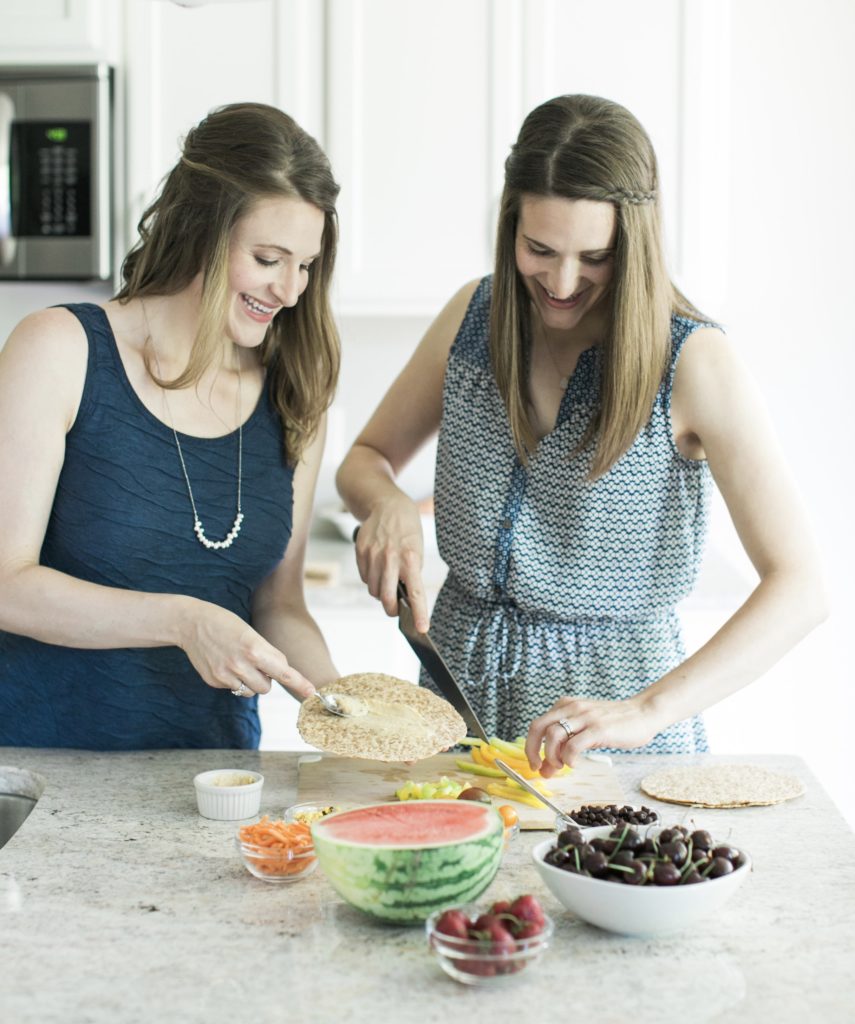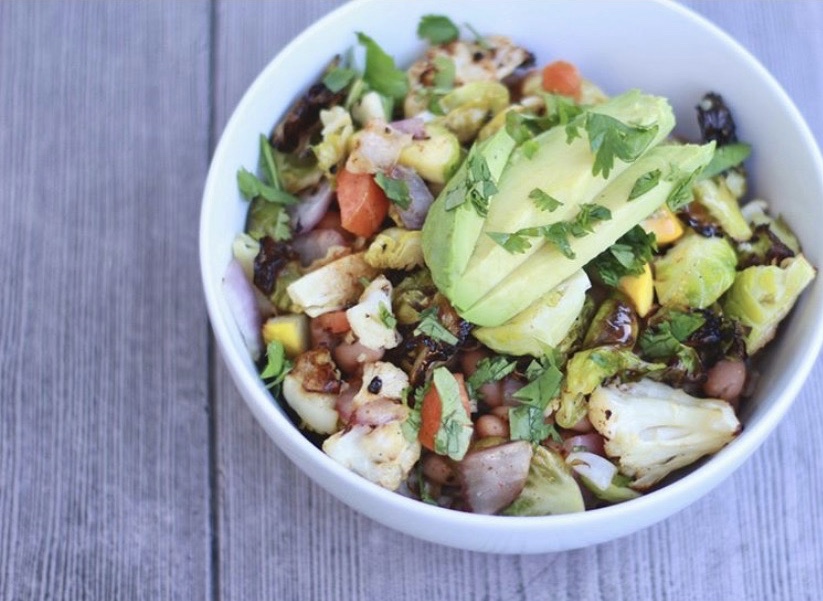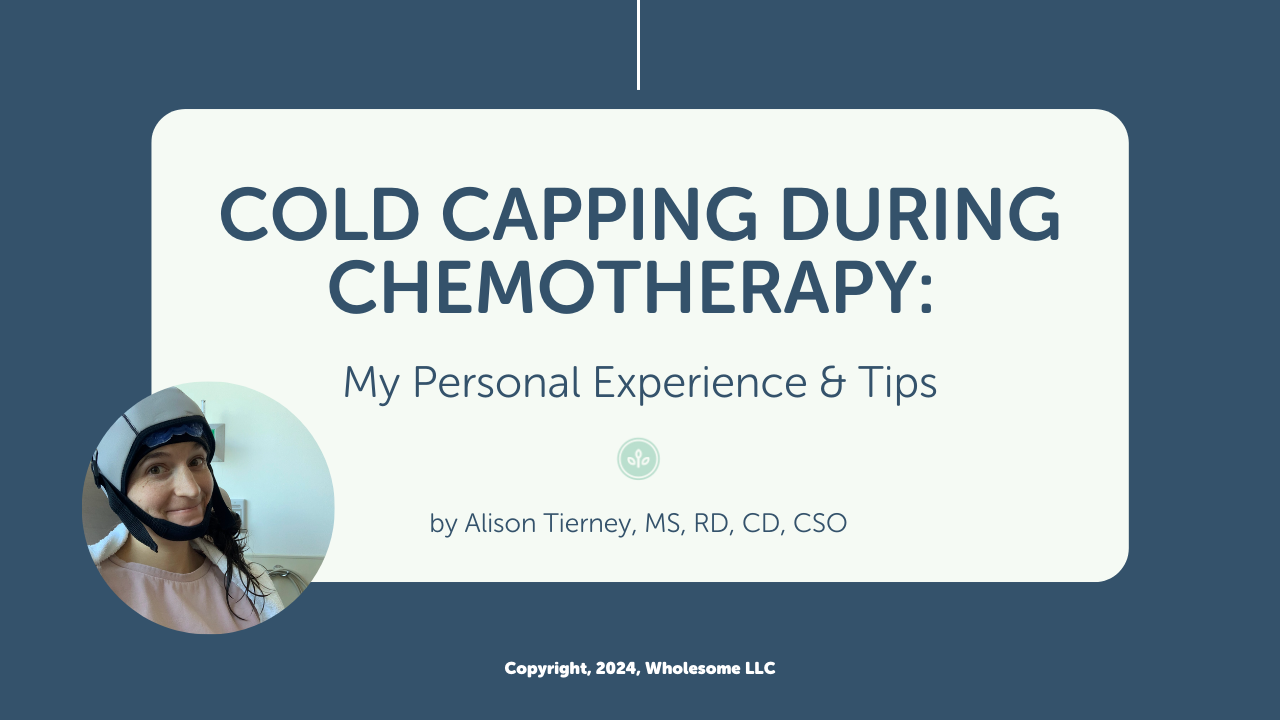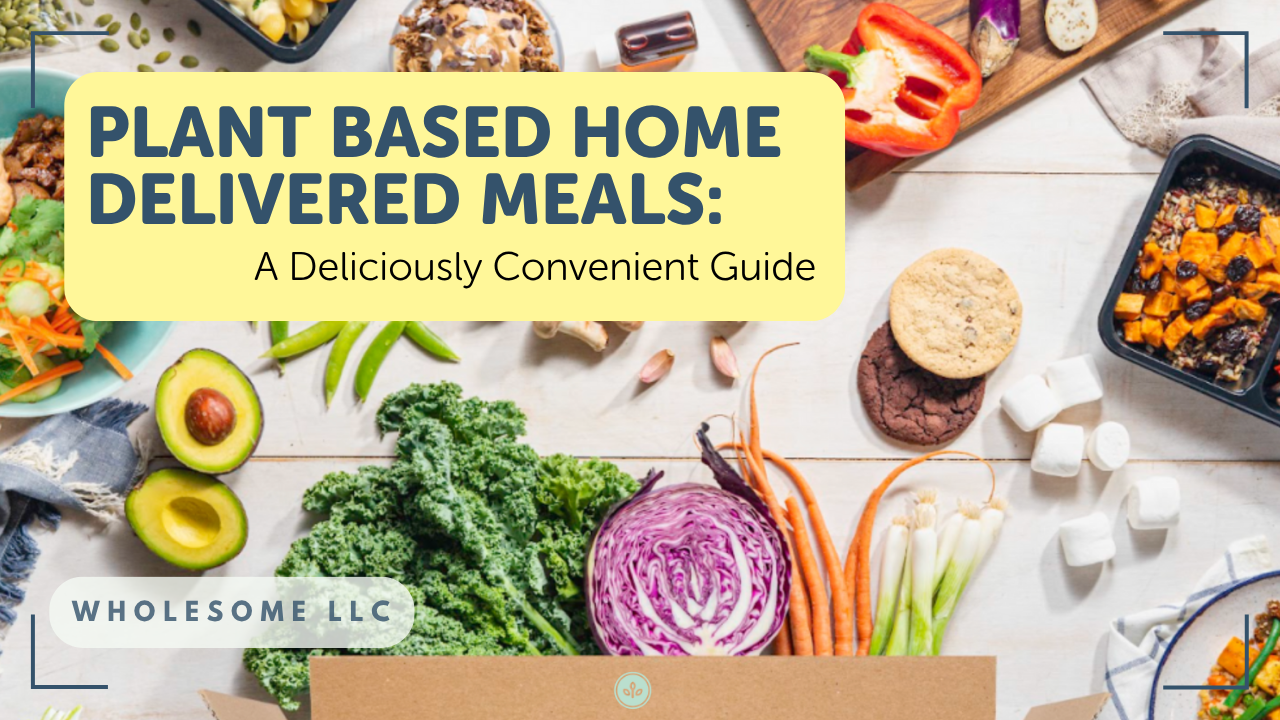The Wholesome Journey - Group Nutrition Coaching Program
Mentorship Program, 1:1 Nutrition Coaching with Alison
What do you want to learn more about?
Program Login
Podcast Features
June 6, 2019
Alison Tierney, MS, RD, CD, CSO
Alison is a registered dietitian, board-certified in oncology nutrition, and a cancer thriver. Her expertise in oncology nutrition and personal experience with her own cancer diagnosis and its treatment provide her with the unique perspective of being able to relate to her clients on an entirely different level. Her content is consistently focused on evidence-based guidelines and seeks to increase the awareness of the power of nutrition to complement traditional cancer therapies.
- Alison Tierney, MS, RD, CD, CSO
- Alison Tierney, MS, RD, CD, CSO
- Alison Tierney, MS, RD, CD, CSO
- Alison Tierney, MS, RD, CD, CSO
- Alison Tierney, MS, RD, CD, CSO
- Alison Tierney, MS, RD, CD, CSO
- Alison Tierney, MS, RD, CD, CSO
- Alison Tierney, MS, RD, CD, CSO
- Alison Tierney, MS, RD, CD, CSO
- Alison Tierney, MS, RD, CD, CSO
- Alison Tierney, MS, RD, CD, CSO
- Alison Tierney, MS, RD, CD, CSO
- Alison Tierney, MS, RD, CD, CSO
- Alison Tierney, MS, RD, CD, CSO
- Alison Tierney, MS, RD, CD, CSO
- Alison Tierney, MS, RD, CD, CSO
- Alison Tierney, MS, RD, CD, CSO
- Alison Tierney, MS, RD, CD, CSO
- Alison Tierney, MS, RD, CD, CSO
- Alison Tierney, MS, RD, CD, CSO
- Alison Tierney, MS, RD, CD, CSO
- Alison Tierney, MS, RD, CD, CSO
- Alison Tierney, MS, RD, CD, CSO
- Alison Tierney, MS, RD, CD, CSO
- Alison Tierney, MS, RD, CD, CSO
- Alison Tierney, MS, RD, CD, CSO
- Alison Tierney, MS, RD, CD, CSO
- Alison Tierney, MS, RD, CD, CSO
- Alison Tierney, MS, RD, CD, CSO
- Alison Tierney, MS, RD, CD, CSO
- Alison Tierney, MS, RD, CD, CSO
- Alison Tierney, MS, RD, CD, CSO
- Alison Tierney, MS, RD, CD, CSO
- Alison Tierney, MS, RD, CD, CSO
- Alison Tierney, MS, RD, CD, CSO
- Alison Tierney, MS, RD, CD, CSO
- Alison Tierney, MS, RD, CD, CSO
- Alison Tierney, MS, RD, CD, CSO
- Alison Tierney, MS, RD, CD, CSO
- Alison Tierney, MS, RD, CD, CSO
- Alison Tierney, MS, RD, CD, CSO
- Alison Tierney, MS, RD, CD, CSO
- Alison Tierney, MS, RD, CD, CSO
- Alison Tierney, MS, RD, CD, CSO
- Alison Tierney, MS, RD, CD, CSO
- Alison Tierney, MS, RD, CD, CSO
- Alison Tierney, MS, RD, CD, CSO
- Alison Tierney, MS, RD, CD, CSO
- Alison Tierney, MS, RD, CD, CSO
- Alison Tierney, MS, RD, CD, CSO
- Alison Tierney, MS, RD, CD, CSO
- Alison Tierney, MS, RD, CD, CSO
- Alison Tierney, MS, RD, CD, CSO
- Alison Tierney, MS, RD, CD, CSO
- Alison Tierney, MS, RD, CD, CSO
- Alison Tierney, MS, RD, CD, CSO
- Alison Tierney, MS, RD, CD, CSO
- Alison Tierney, MS, RD, CD, CSO
- Alison Tierney, MS, RD, CD, CSO
- Alison Tierney, MS, RD, CD, CSO
- Alison Tierney, MS, RD, CD, CSO
- Alison Tierney, MS, RD, CD, CSO
- Alison Tierney, MS, RD, CD, CSO
- Alison Tierney, MS, RD, CD, CSO
- Alison Tierney, MS, RD, CD, CSO
- Alison Tierney, MS, RD, CD, CSO
- Alison Tierney, MS, RD, CD, CSO
- Alison Tierney, MS, RD, CD, CSO
- Alison Tierney, MS, RD, CD, CSO
- Alison Tierney, MS, RD, CD, CSO
- Alison Tierney, MS, RD, CD, CSO
- Alison Tierney, MS, RD, CD, CSO
- Alison Tierney, MS, RD, CD, CSO
- Alison Tierney, MS, RD, CD, CSO
- Alison Tierney, MS, RD, CD, CSO
- Alison Tierney, MS, RD, CD, CSO
- Alison Tierney, MS, RD, CD, CSO
- Alison Tierney, MS, RD, CD, CSO
- Alison Tierney, MS, RD, CD, CSO
- Alison Tierney, MS, RD, CD, CSO
- Alison Tierney, MS, RD, CD, CSO
- Alison Tierney, MS, RD, CD, CSO
- Alison Tierney, MS, RD, CD, CSO
- Alison Tierney, MS, RD, CD, CSO
- Alison Tierney, MS, RD, CD, CSO
- Alison Tierney, MS, RD, CD, CSO
- Alison Tierney, MS, RD, CD, CSO
- Alison Tierney, MS, RD, CD, CSO
- Alison Tierney, MS, RD, CD, CSO
- Alison Tierney, MS, RD, CD, CSO
- Alison Tierney, MS, RD, CD, CSO
- Alison Tierney, MS, RD, CD, CSO
- Alison Tierney, MS, RD, CD, CSO
- Alison Tierney, MS, RD, CD, CSO
- Alison Tierney, MS, RD, CD, CSO
- Alison Tierney, MS, RD, CD, CSO
- Alison Tierney, MS, RD, CD, CSO
- Alison Tierney, MS, RD, CD, CSO
- Alison Tierney, MS, RD, CD, CSO
- Alison Tierney, MS, RD, CD, CSO
- Alison Tierney, MS, RD, CD, CSO
- Alison Tierney, MS, RD, CD, CSO
- Alison Tierney, MS, RD, CD, CSO
- Alison Tierney, MS, RD, CD, CSO
- Alison Tierney, MS, RD, CD, CSO
- Alison Tierney, MS, RD, CD, CSO
- Alison Tierney, MS, RD, CD, CSO
- Alison Tierney, MS, RD, CD, CSO
- Alison Tierney, MS, RD, CD, CSO
- Alison Tierney, MS, RD, CD, CSO
- Alison Tierney, MS, RD, CD, CSO
- Alison Tierney, MS, RD, CD, CSO
- Alison Tierney, MS, RD, CD, CSO
- Alison Tierney, MS, RD, CD, CSO
- Alison Tierney, MS, RD, CD, CSO
- Alison Tierney, MS, RD, CD, CSO
- Alison Tierney, MS, RD, CD, CSO
- Alison Tierney, MS, RD, CD, CSO
- Alison Tierney, MS, RD, CD, CSO
- Alison Tierney, MS, RD, CD, CSO
- Alison Tierney, MS, RD, CD, CSO
- Alison Tierney, MS, RD, CD, CSO
- Alison Tierney, MS, RD, CD, CSO
Transitioning to a plant-based diet can be a daunting task, especially if you’re used to eating meat and dairy products. However, incorporating more plants into your diet can help reduce the risk of cancer and its recurrence while helping to reduce your carbon footprint. Here are five tips to help you make the transition to a plant-based diet.
Agencies on Cancer Recommend a Plant-Based Diet
It’s likely you’ve noticed an increase in plant-based or vegan options at virtually every restaurant and grocery store. Not only does a transition to plant-based help reduce one’s carbon footprint, it is also the recommended dietary pattern recommended by cancer agencies around the world.
The World Cancer Research Fund, American Institute for Cancer Research, and the American Cancer Society all recommend individuals focus on whole, plant-based foods to reduce the risk of cancer and its recurrence. The Third Expert Report states: “Make whole grains, vegetables, fruit, and pulses (legumes) such as beans and lentils a major part of your daily diet.” (1, 2)

What Does Plant-Based Mean?
A plant-based diet can mean eating a 100% plant-based, or simply focusing on incorporating more plants while consuming some animal-based products. Here at Wholesome, we don’t care what category you fall into as we’ll always encourage you to…
Eat more plants.
Since we made the journey from an omnivorous diet to a plant-based diet, we know it isn’t necessarily an easy journey. And it comes easier for some.
If you are seeking to fully transition to a 100% plant-based diet, or just center your diet around whole, plant-based foods here are some tips to start the transition.
1. Add Before You Subtract
It can be overwhelming to think about limiting or eliminating animal products. Many of us grew up eating meat, fish, dairy, etc. every day (just like we did). Stepping away from animal products cold-turkey is daunting.
Recall the plant-based diet is focused on whole, plant-based foods such as fruits, vegetables, whole grains, and legumes. It also recommends avoiding highly processed foods. So, before you remove animal products simply consider adding more whole, plant-based foods as they contain phytochemicals –cancer and disease fighting properties.
When you focus on what you can add, rather then what you “can’t have”, it will greatly improve your mindset.
Pro Tip: When you sit down for meals, take a look. Do you have a fruit and vegetable with each meal? Or, do you have two servings of vegetables? This simple focus can help improve your meals without too much thought.
2. Keep it Simple
Many individuals contemplating the transition to plant-based often worried they will be spending hours in the kitchen to creating nutritious and satisfying meals. The truth is, you don’t have to spend hours, sometimes only a few minutes is needed.
We find the best meals are simple and don’t require a recipe. Use your cooking experience, even if limited, to play with ingredients you have on hand. Use different cooking methods and flavorings and throw it all together. Viola!
Pro Tip: Our favorite way of making a nutritionally complete, easy meal includes the following 4 main food groups:
- Whole Grain or Starchy Vegetable
- Legume
- Non-Strarchy Vegetable
- Fruit
For example, roast sweet potatoes. Roast canned (and rinsed) chickpeas in approximately 2 tablespoons pure maple syrup. Roast a variety of your favorite veggies. Mix all together and add a side serving of fruit. Yum!

3. Slow & Steady on the Road to Become Plant-Based
Many clients often get upset with themselves when they eat processed food, an animal product, or a treat and feel as though they have failed. This isn’t true at all!
When babies learn to walk, it is a slow steady progression. When you learn to throw a baseball for the first time, you likely don’t have the perfect form right away. In fact, when you learn any new skill, there is a learning curve. This process is no different. Practice is essential, and perfecting improving the skill takes time.
Pro Tip: Consider your current diet. Do you include dairy 3x per day? Do you eat meat every day of the week? Consider making small changes and alter the goal as you progress. Aim to eat dairy only 2x per day or meat 5x per week. Small changes lead to big strides.
4. Find a Few Favorites
Many of us have a few favorite foods that are likely whole, plant-based foods. Do you like potatoes? Deliciously summer ripened berries? Grilled vegetables? What about a comforting chili?
It’s likely some of your favorite foods already fit into your new lifestyle — they just might need a little tweaking. Start with these before necessarily trying new foods. There is no reason to mess too much with a perfectly good classic!
Pro Tip: Find recipes for your favorite dishes that will provide similar flavors you already enjoy. Can we suggest Hearty Vegetable Chili? Lentil Tacos? Pasta Primavera?
5. Grant Yourself Grace
Grace is defined as “courteous goodwill”. Often times, we forget to provide ourselves with this goodwill.
If your best friend was embarking on a new experience, how would you encourage him or her? Do you do the same for yourself? For many of us, the answer is no.
When focused on improving your diet and lifestyle, give yourself the gift of grace. Know there will be times when you don’t get it exactly right. Learn from those times and consider how you could have made the situation better.
And when you do get it ‘right’, celebrate the small victories. Because life is too short to not celebrate the little things.
References:
- World Cancer Research Fund and the American Institute for Cancer Research. Diet, Nutrition, Physical Activity and Cancer: A Global Perspective. Published 2018. Accessed March 7, 2023. https://www.wcrf.org/wp-content/uploads/2021/02/Summary-of-Third-Expert-Report-2018.pdf
- Rock, C.L., Thomson, C., Gansler, T., Gapstur, S.M., McCullough, M.L., Patel, A.V., Andrews, K.S., Bandera, E.V., Spees, C.K., Robien, K., Hartman, S., Sullivan, K., Grant, B.L., Hamilton, K.K., Kushi, L.H., Caan, B.J., Kibbe, D., Black, J.D., Wiedt, T.L., McMahon, C., Sloan, K. and Doyle, C. (2020), American Cancer Society guideline for diet and physical activity for cancer prevention. CA A Cancer J Clin, 70: 245-271.

Post Updated April 2023
5 Tips to Aid the Transition to Plant-Based
Leave a Reply Cancel reply
Featured Articles
Wholesome LLC is not a medical practice, and its employees cannot offer medical advice. This website provides educational information but it is not a substitute for medical advice from a licensed medical professional who is familiar with your particular facts and circumstances. The information contained on this website is not intended to diagnose, treat, or cure any disease and shall not be construed as medical advice. The information and education on this website is provided for you to use at your own discretion.
You can further review our disclaimer here.
Wholesome
About Alison
Courses & Programs
The Wholesome Journey
Free Resources
FAQs
Press & Media
Recipes
Blog
Contact Us
Shop
© 2026 Wholesome, LLC All rights reserved.
Privacy Policy
Terms of Use
Disclaimer
Mobile Terms of Service



Be the first to comment